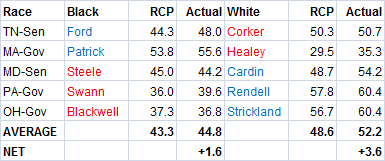Bradley Effect? Or Elephant Effect?
I have received quite a number of requests for comment on the article published by Republican consultant Bill Greener at Salon.com. The article purports to find evidence of a "Bradley Effect" in Senate and Gubernatorial Elections in involving black candidates in 2006.
So, I'll comment on it...So, it wasn't just black Republicans who were undeperforming their polls; it was white Republicans too (likewise with Rick Santorum in Pennsylvania): not a 'Bradley Effect' so much as an 'Elephant Effect'.
But it wouldn't please a Republican consultant to talk about that, now would it?
Bradley Effect? Or Elephant Effect?
I have received quite a number of requests for comment on the article published by Republican consultant Bill Greener at Salon.com. The article purports to find evidence of a "Bradley Effect" in Senate and Gubernatorial Elections in involving black candidates in 2006.
So, I'll comment on it.
Problem #1: Greener cites data from four races: the Tennessee and Maryland senate races, and the Massachusetts and Ohio governor's races. Greene, however, ignores a fifth race, the Pennsylvania governor's race, in which a white Democrat, Ed Rendell, competed against a white Republican, Lynn Swann.
Rendell defeated Swann in this race. However, Rendell's margin of victory was no larger than that predicted by the polls (in fact, it was incrementally smaller). Greener completely ignores this race.
(There was actually a sixth race involving a black candidate, that being in Mississippi, where Trent Lott won re-election to the Senate over Erik Fleming. However, there was essentially no polling of this race, so it isn't useful to us.)
Problem #2: Greener cherry-picks his data in literally every race. He isn't even subtle about it. Here is a good example:
How about Tennessee, where black Democrat Harold Ford was up against white Republican Bob Corker for Republican Bill Frist's old U.S. Senate seat? Harold Ford did slightly better than Steele and Blackwell. The day before the election, he was within a point of Corker, 47 to 48 with 5 percent undecided, according to OnPoint Polling. On Nov. 7, Corker got 50.7 percent of the vote, Ford got 48 and an assortment of independents took 1.3 percent. Ford was able to pick up one out of every five undecided voters.
OnPoint was the only polling firm to show the Tennessee race within 1 point on the eve of the election. Meanwhile, Gallup showed a 3-point lead for Corker, Rasmussen showed a 4-point lead for Corker, SurveyUSA and Pollmetrix showed 5-point leads, and Mason-Dixon showed a 12-point lead. Corker eventually won by 2.7 points, smaller than the margin predicted by all firms but OnPoint.
A more comprehensive way to look at this question would be to compare the performance of the black candidates against a more comprehensive set of polling, such as the Real Clear Politics averages. Here is what such a comparison reveals:
On average, the black candidate received 44.8 percent of the vote, as compared to the 43.3 percent predicted by the polls. The white candidate received 52.2 percent of the vote, as compared to the 48.6 percent predicted by the polls. In looking at the actual versus predicted margins of victory, the black candidate overperformed his polling in Tennessee and Pennsylvania, and underperformed it in Massachusetts, Maryland and Ohio. Although the white candidates did perform a little better on balance, this is not very persuasive evidence given that we have only five data points to look at, and that polling in mid-term elections is generally fairly marginal. (Put more succinctly, the differences aren't statistically significant).
The two races where the black candidate did perform notably worse than their polling were in Ohio (Ken Blackwell) and Maryland (Michael Steele). Each of these candidates were Republicans. This leads us to...
Problem #3. The year 2006, as you may recall, was a very bad one for Republicans. Democratic candidates overperformed their poll in a significant majority of competitive races around the country.
In fact, there were other races going on at the same time in Maryland and Ohio, both of which involved two white candidates. In Maryland, there was also a race for Governor; the Democrat, Martin O'Malley, was projected by the RCP average to defeat the Republican, Robert Ehrlich, by 1.3 points. In fact, O'Malley won by 6.5 points. In Ohio, meanwhile, the Democratic candidate for Senate, Sherrod Brown, was projected by RCP to defeat the Republican, Mike DeWine, by 10.0 points. In fact, Brown won by 12.3 points.
So, it wasn't just black Republicans who were undeperforming their polls; it was white Republicans too (likewise with Rick Santorum in Pennsylvania): not a 'Bradley Effect' so much as an 'Elephant Effect'.
But it wouldn't please a Republican consultant to talk about that, now would it?

0 Comments:
Post a Comment
<< Home